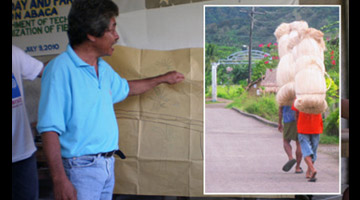 Huge volumes of classified and graded abaca fibers provide farmer-cooperators in Bato and San Andres, Catanduanes greater profits.
Huge volumes of classified and graded abaca fibers provide farmer-cooperators in Bato and San Andres, Catanduanes greater profits.
Thanks to the interventions provided by the project “Supply chain improvement of abaca: Development and simulation of a business support model for the application of fiber grades and standards at the upstream end of the supply chain in Catanduanes”.
Funded by the Philippine Council for Agriculture, Aquatic and Natural Resources Research and Development or PCAARRD, the program equipped the cooperators with the ability to apply fiber grading and classification, enhanced their financial management capability, and developed in them an entrepreneurship mindset.
Having enhanced their capacities through the program, the farmer-cooperators were able to establish an effective market linkage. This enabled them to deliver directly the abaca fibers they produce to the Grader, Baler, and Establishment (GBE), which gives them relatively higher price for each grade.
The cluster-GBE linkage reduced the shrinkage loss from an average of 25 percent to about 14 percent based on the recently conducted project review in Guinobatan, Albay.
The project also revitialized the Catanduanes Abaca Industry Development Board (CAIDB) to oversee the province’s abaca industry and ensure the sustainability of the interventions.
”The CAIDB now has been made more functional and active,” said Dr. Arnulfo M. Mascariñas, project leader and director of the Bicol University Research and Development Center.
